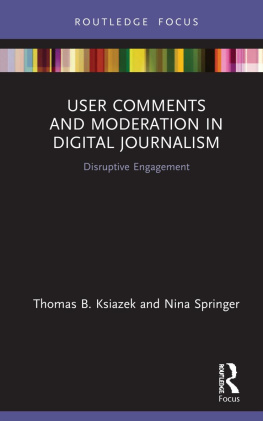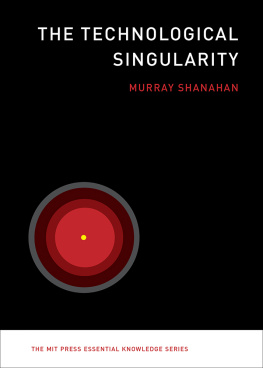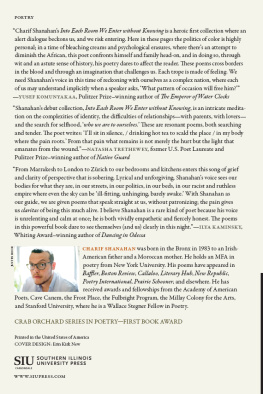
Journalism, Online Comments, and the Future of Public Discourse
Comments on digital news stories and on social media play an increasingly important role in public discourse as more citizens communicate through online networks. The reasons for eliminating comments on news stories are plentiful. Off-topic posts and toxic commentary have been shown to undermine legitimate news reporting. Yet the proliferation of digital communication technology has revolutionized the setting for democratic participation. The digital exchange of ideas and opinions is now a vital component of the democratic landscape. Marie K. Shanahans book argues that public digital discourse is a crucial component of modern democracyone that journalists must stop treating with indifference or detachmentand for news organizations to use journalistic rigor and better design to add value to citizens comments above the social layer. Through original interviews, anecdotes, field observations and summaries of research literature, Shanahan explains the obstacles of digital discourse as well as its promises for journalists in the digital age.
Marie K. Shanahan is an assistant professor of journalism at the University of Connecticut. Her teaching and academic research focus on the intersection of journalism and interactive communication technology. She has been a journalist, online news producer and professional writer for more than 20 years. Her interest in the possibilities of interactive media led her away from an early career as a print reporter at The Hartford Courant to the digital side of news, where she spent 13 years producing online news and dealing with comments on the web. Her academic work has been published by The Poynter Institute, Columbia Journalism Review, The Chronicle of Higher Education, Newsweek, Salon and The Conversation.
First published 2018
by Routledge
711 Third Avenue, New York, NY 10017
and by Routledge
2 Park Square, Milton Park, Abingdon, Oxon OX14 4RN
Routledge is an imprint of the Taylor & Francis Group, an informa business
2018 Taylor & Francis
The right of Marie K. Shanahan to be identified as the author of this work has been asserted by her in accordance with sections 77 and 78 of the Copyright, Designs and Patents Act 1988.
All rights reserved. No part of this book may be reprinted or reproduced or utilized in any form or by any electronic, mechanical, or other means, now known or hereafter invented, including photocopying and recording, or in any information storage or retrieval system, without permission in writing from the publishers.
Trademark notice: Product or corporate names may be trademarks or registered trademarks, and are used only for identification and explanation without intent to infringe.
Library of Congress Cataloging-in-Publication Data
A catalog record for this book has been requested
ISBN: 978-1-138-63023-9 (hbk)
ISBN: 978-1-315-20957-9 (ebk)
Typeset in Times New Roman
by Apex CoVantage, LLC
Life is a collaborative process, and the generous collaboration of many teachers, colleagues, friends and family members enabled me to research and write this book.
For information and inspiration, I am grateful to my former colleagues in the newsroom at The Hartford Courant ; my Quinnipiac University professors who introduced me to the complexities of interactive communications, particularly Alexander Halavais and Joseph H. Cooper; the fellows and faculty members from the 2015 Association of Opinion Journalists Minority Writers seminar; and the many hard-working journalists from the Online News Association, Society of Professional Journalists, Asian American Journalists Association and American Society of Journalists and Authors, who generously shared their knowledge and experiences with me.
For financial support, I was honored to receive a grant from the Public Discourse Project at the Humanities Institute at the University of Connecticut, with special thanks to director Michael P. Lynch.
For invaluable conversations, comments and editing, I am indebted to Kate Farrish, Maureen Croteau, Wayne Worcester, Marcel Dufresne, Lynne Delucia, Naedine Hazell, Donna Larcen, Helen Ubias, Jennifer Rancourt, my Small Writers Group writing buddies and each of my UConn Journalism colleagues.
For their limitless patience, love and support, I am forever thankful to my parents, siblings and cousins; my life partner, Todd; and my beautiful daughters, Julia and Ella.
Lastly, I extend sincere appreciation to all my current and former journalism students, whose fresh perspectives on digital discourse and online culture never fail to seed my curiosity.
1
Bystanders
For I take it that your silence gives consent.
Plato, Cratylus, 435b
On a late Friday afternoon in May 2008, a grandfather in Hartford, Connecticut, strolled out of a neighborhood grocery store with a bottle of milk tucked under his arm. As Angel Arce Torres stepped into the road to cross, a black Honda that was chasing after a tan Toyota swerved into the wrong lane, plowed into the 78-year-old and sped off without stopping. The impact sent the retired forklift operators body flying onto the pavement, where he lay crumpled and bleeding.
The entire terrible scene was captured by a street surveillance camera. In seeking the publics help to identify the Hondas driver, the Hartford Police Department released a graphic 90-second recording of the crash to local news outlets. The disturbing video, enhanced by a state forensic science laboratory, immediately went viral. Not only did the footage show the depravity of the hit-and-run, it also seemed to show bystanders in one of Hartfords predominantly Hispanic neighborhoods ignoring the unconscious elderly man lying in the street. Nine cars and a motorcycle could be seen on the video driving past Torress critically injured body while people on the sidewalk seem to do nothing until a police cruiser arrives about a minute and a half later.
The perceived callousness displayed by bystanders on the video seized the publics attention more than the cruelty of the hit-and-run. provided the perfect recipe for what came next: the vicious online shaming of Connecticuts capital city and its residents.
Back in 2008, the go-to online forums for members of the public to post responses to news reports were slightly different than in 2017. Digital conversations about the news may now be commonplace on social media channels such as Facebook and Twitter, but in 2008, those networks had not yet reached critical mass. If a digital news consumer wanted to react to a story or opine on a topic to the widest possible audience, the best place to sound off was the same location where people read the news in the first place: the comment section at the bottom of the online news story.
My employer at the time The Hartford Courant offered the public just such a digital venue for venting. Any visitor to Courant.com could simply scroll to the end of any story to instantly and anonymously add their commentary to an open and always-on digital discussion space. Amid ongoing coverage of the hit-and-run, the Courants anonymous, unmoderated online comment boards swelled with thousands of posts from around the country.
Extremes of emotion colored the comments. Some remarks were perceptive or heartfelt, but the majority of the discussion about the hit-and-run veered into racist, noxious and off-topic rhetoric about crime-ridden urban dwellers, Puerto Ricans and immigrants. The worst submissions disparaged the citys residents as animals, devils and barbarians and describedever so ironicallyhow Puerto Ricans, Hispanic immigrants and African Americans lacked traditional New England standards of civility. Those comments, which can still be found online today, labeled Hartford an armpit, scum, and so much worse.









